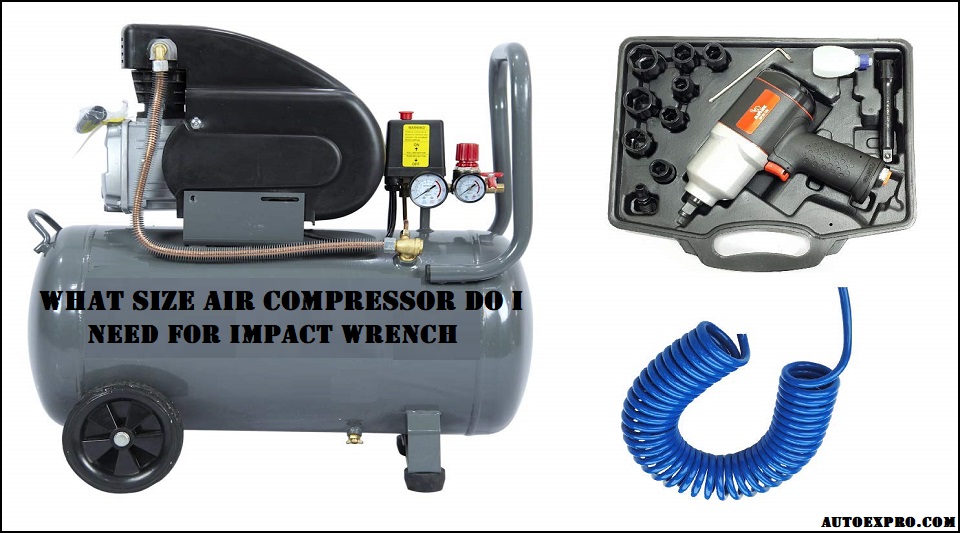 An impact wrench is an air tool which means it should be powered by air compressors. So, when you’re going to purchase an impact wrench for your regular job or weekend DIY activities, there is another thing that you need to buy- an air compressor.
An impact wrench is an air tool which means it should be powered by air compressors. So, when you’re going to purchase an impact wrench for your regular job or weekend DIY activities, there is another thing that you need to buy- an air compressor.
I think purchasing an air compressor for your impact wrench is not a problem. The problem is determining which size air compressor you should buy. That’s why I’m here with a basic guide that can answer a question you have in your mind- what size air compressor do I need for impact wrench?
While buying an air compressor, you must focus on three things- PSI, CFM, and the size of the tank. Let’s know a bit about these three things-
- PSI (Pounds per Square Inch)- PSI rating tells how much pressure the air compressor can deliver per square inch
- CFM (Cubic Feet per Minute)- CFM is the rating that declares the volume of air it delivers per minute
- Size of the Tank- The tank size is typically measured in Gallon. It denotes the amount of air the tank can carry each time you fill it.
I hope you’ve understood these three things. Now it is time to find out how should you pick a right-sized air compressor for your impact wrench.

What Size Air Compressor Do I Need for Impact Wrench?
To make the best choice that goes with your impact wrench, you should pick an air compressor considering the below 3 points.
1. How to Pick the Right PSI?
Typically most of the single-stage air compressors come with an air pressure of around 90 to 120 PSI. This is the common range of PSI. As there is no variation, you won’t have to be that much worried about the PSI while buying an air compressor for impact wrench. However, I’ll suggest buying one that comes with higher PSI, probably 110 or 120 PSI.
But, if your work is more related to rusted or frozen fasteners, it is better for you to get a double-stage air compressor. Frozen or rusted fasteners need comparatively more torque. In such cases, double-stage air compressors can help you by delivering around 170 to 175 PSI so that you can fight and win against the most stubborn fasteners.
Related Post: What is Inside a Catalytic Converter?
2. The CFM Rating You Need for Your Impact Wrench?
So, you’ve seen that you don’t have to worry much about the PSI. But, CFM is something that should be properly checked before you select an air compressor to pick. CFM differs widely in different air compressors. To get the best out of your impact wrench, you should pick the air compressor that can deliver the exact amount of air it needs.
The CFM you should choose depends on the size of the impact wrench. Below here, I’m going to talk about the CFM needed for the most commonly used sizes of impact wrenches.
- ¼-inch Impact Wrenches
For such small impact wrenches, you won’t need to have an air compressor with a high CFM rating. Typically, a 1 to 1.5 CFM air compressor will do the work perfectly. If you want, you can go for higher CFM ratings, but that won’t be necessary. So, if you don’t want to spend much, go for something that delivers 1 to 1.5 CFM.
- 3/8-inch Impact Wrenches
It is needless to say that 3/8-inch impact wrenches need more air power than 1/4-inch ones. So, in such cases, I’ll suggest buying an air compressor with a 3 or 3.5 CFM rating. Well, you can go for one that delivers 2.5 CFM, but that is too close to the edge. There is a chance that you won’t receive the expected performance sometimes. So, if you are not under budget constrain, for your 3/8-inch impact wrench, you should pick an air compressor that delivers around 3 CFM.
- ½-inch Impact Wrenches
This is probably the most common size that is used everywhere. So, making a decision in such a case is really easy. Ask someone who uses this sized impact wrench and you’ll get the answer. However, in my opinion, buying an air compressor that delivers 4 to 5 CFM air. This will help you to get your things perfectly.
Also, you can use a 3.5 CFM air compressor to run a ½-inch impact wrench. But I don’t suggest buying this size unless you’re on a budget. If you have the scope, try to buy one with a 5 CFM rating.
- 1-inch Impact Wrenches
This is not something that is commonly used by DIYers. 1-inch impact wrenches are used in construction sites for large tasks. So, the air compressor also should be powerful and huge. So, in such cases, I suggest you buy an air compressor that comes with a 9 or 10 CFM rating. It’ll cost you a lot, but construction sites need air compressors for a lot of reasons. So, the investment is worthy.

Helpful Tips: Air Tool CFM Chart
Here are some of the most common air tools and their average CFM requirements. Keep in mind that air tools are rated on a 25% duty cycle (in use for 15 seconds out of every 60 seconds) so for continuous use tools such as grinders, you may want to multiple the CFM number by 4.
| Air Tool | Avg. CFM @90 PSI | Avg. Operating PSI |
|---|---|---|
| Air Hammer | 4 | 90-100 |
| Angle Grinder | 5-8 | 90-100 |
| Blow Gun | 2-3 | 90-100 |
| Brad Nailer | 0.5 | 70-90 |
| Die Grinder | 5 | 70-90 |
| Disc Sander | 20 | 90-100 |
| Drill | 4 | 70-90 |
| Framing Nailer | 2 | 100-130 |
| Grease Gun | 3 | 120-150 |
| Hydraulic Riveter | 4 | 90-100 |
| Impact Driver (1/2″) | 4 | 90-100 |
| Impact Driver (3/4″) | 7 | 90-100 |
| Impact Driver (1″) | 12 | 90-100 |
| Impact Wrench (3/8″) | 3 | 90-100 |
| Impact Wrench (1/2″) | 4 | 90-100 |
| Impact Wrench (1″) | 10 | 90-100 |
| Orbital Sander | 6-9 | 70-100 |
| Paint Spray Gun | 4-8 | 90-100 |
| Ratchet (1/4″) | 3 | 90-100 |
| Ratchet (3/8″) | 4 | 90-100 |
| Speed Saw | 4 | 90-100 |
| Staple Gun | 2 | 70-90 |
| Tire Inflator | 2 | 125-150 |
3. The Size of Air Compressor Tank for Impact Wrench
While choosing an air compressor for your impact wrench, you should focus on the size of the tank too. It is an important issue to make your work comfortable.
The size of the tank tells how much air a compressor can store. A 20-gallon air compressor can surely carry more air than the amount of air a 6-gallon air compressor can carry. As a result, by filling the 20-gallon compressor once, you can work for a long time. So, I guess you’ll go for a large one. But wait. There is something more which you should look at.
A 20-gallon air compressor comes with less portability because carrying it is a hassle. As an impact wrench is an intermittent tool and you have the scope of having a break while operating it, you can take the opportunity of picking a smaller one, probably a 6-gallon one, which ensures more portability. You can simply take a break to fill up the tank.
The choice is always yours. I’ve shown you the pros and cons of both. Now it is your time to make a decision to pick one.
If you ask me my opinion about choosing a perfect sized tank, I’ll go for a 10-gallon tank. I always love to stay on the safe side. Picking up a 10-gallon one will give me continuity and portability both at a moderate level.
Final Verdict
I hope you’ve got an idea about what size air compressor you should pick for your impact wrench. Now it is time to select one from a lot available in the market.
Typically for DIY works at home, picking an air compressor that delivers 5 CFM and comes with around a 10-gallon tank is my recommendation. But some other things affect the decision, including the budget. So, it is up to you to pick one that’ll be the best for you from all aspects.
What Size Air Compressor Do I Need for My Air Tools?
Leave a Reply